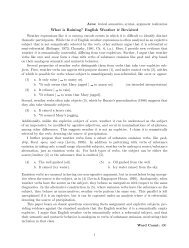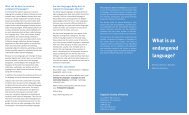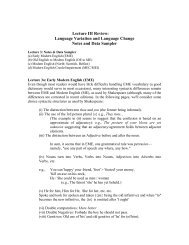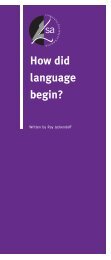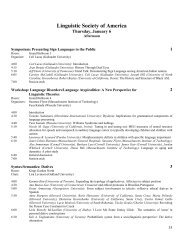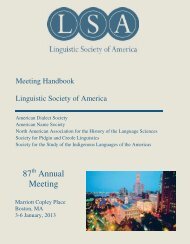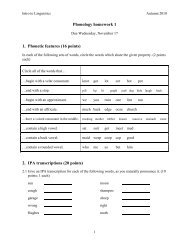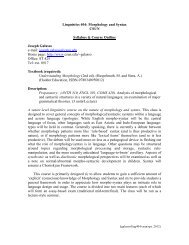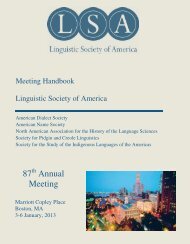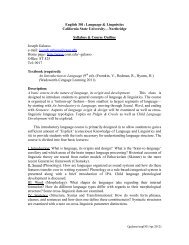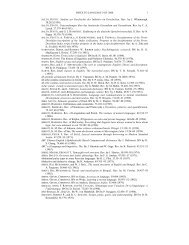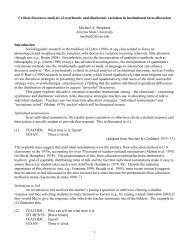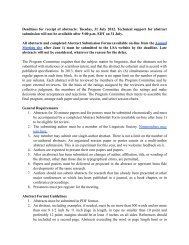Friday, 5 JanuaryPlenary AddressCalifornia C7:00 – 8:00 PMLanguage Variation and <strong>Linguistic</strong> InvariantsEdward L. KeenanUniversity <strong>of</strong> California, Los AngelesI show how to state structural invariants <strong>of</strong> human language even assuming that grammars <strong>of</strong> particular languages are structurallydistinct, e.g. have different grammatical categories. Given a grammar G for a set L(G) <strong>of</strong> expressions, a structure (preserving) map(sm) for G is a bijection from L(G) to L(G) that preserves how expressions are built up. So for h a sm, a rule R derives z from x and yif R derives h(z) from h(x) and h(y). Two expressions have <strong>the</strong> same structure if one can be mapped to <strong>the</strong> o<strong>the</strong>r by a sm. Aninvariant <strong>of</strong> G is an expression, a property <strong>of</strong> expressions, a relation between expressions,...which is mapped to itself (fixed) by all<strong>the</strong> sm's. That is, replacing it by anything else changes structure. (To say a sm h fixes a relation R just says xRy if h(x)Rh(y)). Thestructure <strong>of</strong> G is given by its set <strong>of</strong> sm's, its symmetry group. Empirically we support that:• The anaphor-antecedent relation is invariant in <strong>the</strong> languages we have modeled (English, Korean, Toba Batak, and WestGreenlandic). It is (partially) coded by case marking in Korean and voice marking in Toba. Both allow anaphors to asymmetrically c-command <strong>the</strong>ir antecedents, structurally distinct from English.• (Provably is a constituent <strong>of</strong> and c-command, generalized, are invariant relations for all G).• Grammatical formatives, such as case, voice, and applicative affixes, are <strong>the</strong>mselves invariant (fixed by all sm's, notsimply ‘reflections’ <strong>of</strong> hierarchical structure).• Agreement classes are stable-invariants (fixed by all stable sm's--ones that extend to sm's when new lexical itemsisomorphic to old ones are [iteratively] added to <strong>the</strong> language). In general, for any category C in a grammar, <strong>the</strong> property <strong>of</strong> havingcategory C is a stable invariant.• Theta role assignment is invariant (a function <strong>of</strong> structure). [This does not imply UTAH, which requires that <strong>the</strong> functionbe one to one].• Greenberg duality. The class <strong>of</strong> possible human grammars is closed under word order duals. A G and its dual are notisomorphic but have isomorphic symmetry groups.A Goal <strong>of</strong> General <strong>Linguistic</strong>s: Classify languages by <strong>the</strong> symmetry groups <strong>of</strong> <strong>the</strong>ir grammars.Edward L. Keenan is a Distinguished Pr<strong>of</strong>essor in <strong>the</strong> Department <strong>of</strong> <strong>Linguistic</strong>s at UCLA and a member <strong>of</strong> <strong>the</strong> <strong>America</strong>n Academy<strong>of</strong> Arts and Sciences. He has been on faculties in England, Holland, Germany, France, Israel, Madagascar, and New Zealand. He hasco-authored two books: Boolean semantics for natural language, with Leonard Faltz (1985), and Bare grammar: Lectures onlinguistic invariants, with Edward Stabler (2003).67
Saturday, 6 JanuaryPlenary AddressCalifornia C12:30 – 1:30 PMThe Future <strong>of</strong> <strong>Linguistic</strong>sMark LibermanUniversity <strong>of</strong> PennsylvaniaAbout 10 years ago, a publisher's representative told me that introductory linguistics courses in <strong>the</strong> U.S. enroll 50,000 students peryear while introductory psychology courses enroll about 1,500,000, or 30 times more. The <strong>Linguistic</strong> <strong>Society</strong> <strong>of</strong> <strong>America</strong> has about4,000 members while <strong>the</strong> <strong>America</strong>n Psychological Association has more than 150,000 members, or about 38 times more. Comparisonsbetween linguistics and fields like history or chemistry give similar results.It's easy to accept this state <strong>of</strong> affairs as natural, but in fact it's bizarre, both historically and logically. Fur<strong>the</strong>rmore, it's part <strong>of</strong> a largerand much more serious problem. Those who are resigned to <strong>the</strong> fate <strong>of</strong> our academic discipline should still be disturbed thatcontemporary intellectuals learn almost no skills for analyzing <strong>the</strong> form and content <strong>of</strong> speech and text, so that few writing instructorscan even identify instances <strong>of</strong> <strong>the</strong> passive voice that <strong>the</strong>y urge <strong>the</strong>ir students to avoid. More seriously, <strong>the</strong> teaching <strong>of</strong> reading is sowidely based on false or nonsensical ideas about speech and language that a quarter <strong>of</strong> all students emerge from elementary schoolwith difficulties serious enough to interfere with <strong>the</strong> rest <strong>of</strong> <strong>the</strong>ir education.To break <strong>the</strong> grip <strong>of</strong> familiarity, it may help to view <strong>the</strong> past 150 years <strong>of</strong> intellectual history as a poker game. The academicdisciplines concerned with speech and language began with a bigger stake than almost anyone else at <strong>the</strong> table and have been dealt aseries <strong>of</strong> very strong hands. However, <strong>the</strong> role <strong>of</strong> linguistic research and teaching in English, foreign languages, and anthropology isdramatically smaller than it once was, and <strong>the</strong> field <strong>of</strong> linguistics itself is a marginal player, in danger <strong>of</strong> being busted out <strong>of</strong> <strong>the</strong> gameentirely.I review our unfortunate past and discuss <strong>the</strong> prospects for a brighter future, in which linguistics might reach parity with fields likema<strong>the</strong>matics, psychology, and English.Mark Liberman (PhD, Massachusetts Institute <strong>of</strong> Technology, 1975) worked for AT&T Bell Laboratories from 1975-990, ending ashead <strong>of</strong> <strong>the</strong> <strong>Linguistic</strong>s Research Department. He <strong>the</strong>n moved to <strong>the</strong> University <strong>of</strong> Pennsylvania as Trustee Pr<strong>of</strong>essor <strong>of</strong> Phonetics in<strong>Linguistic</strong>s, with a secondary appointment in <strong>the</strong> Department <strong>of</strong> Computer and Information Science. He has been <strong>the</strong> director <strong>of</strong> <strong>the</strong><strong>Linguistic</strong> Data Consortium since its foundation in 1992 and was co-director <strong>of</strong> <strong>the</strong> Institute for Research in Cognitive Science from2000-2006. He is also Faculty Master <strong>of</strong> Ware College House and faculty director <strong>of</strong> College Houses and Academic Services at Penn.In 2003, he co-founded “Language Log”, which now averages more than 7,000 readers a day. His recent research has been ininformation extraction from biomedical text and in <strong>the</strong> prosody <strong>of</strong> conversational speech.68
- Page 1:
MEETING HANDBOOKLINGUISTIC SOCIETY
- Page 5 and 6: Meeting RoomsSECOND FLOORFOURTH FLO
- Page 7: • LSA: Business Meeting and Award
- Page 11 and 12: LSAThursday, 4 JanuaryEveningWelcom
- Page 13 and 14: Friday MorningLSAConstructions and
- Page 15 and 16: LSAFriday, 5 JanuaryAfternoonInvite
- Page 17 and 18: Friday AfternoonLSAModeling Acquisi
- Page 19 and 20: LSARules for Motions and Resolution
- Page 24 and 25: LSASaturday AfternoonSymposium: Par
- Page 26 and 27: LSASaturday AfternoonSyntactic Face
- Page 28 and 29: LSASunday MorningFirst Language Acq
- Page 30 and 31: American Dialect SocietyThursday, 4
- Page 32 and 33: ADSSaturday, 6 JanuaryMorningSessio
- Page 34 and 35: American Name SocietyThursday, 4 Ja
- Page 36 and 37: ANSFriday AfternoonForms of Address
- Page 38 and 39: ANSSaturday AfternoonHistorical Ono
- Page 40 and 41: Society for Pidgin and Creole Lingu
- Page 42 and 43: SPCLSaturday, 6 JanuaryMorningSpeci
- Page 44 and 45: Society for the Study of the Indige
- Page 46 and 47: SSILAFriday AfternoonPhonology and
- Page 48 and 49: SSILASunday, 7 JanuaryMorningSemant
- Page 50 and 51: Part 1: Thursday, 4 JanuaryPart 2:
- Page 52 and 53: Donca Steriade (Massachusetts Insti
- Page 56: Saturday, 6 JanuaryPresidential Add
- Page 59 and 60: Thursday, 4 JanuaryTutorialA Field
- Page 61 and 62: Thursday, 4 JanuarySymposiumContinu
- Page 63 and 64: Friday, 5 JanuarySymposiumApproache
- Page 65 and 66: Friday, 5 JanuaryDigital Poster Ses
- Page 67 and 68: Stephen R. Anderson (Yale Universit
- Page 69 and 70: David Bowie (University of Central
- Page 71 and 72: Sharon Peperkamp (CNRS/University o
- Page 73 and 74: Elena Guerzoni (University of South
- Page 75 and 76: Claire Bowern (Rice University)Morp
- Page 77 and 78: Lise Dobrin (University of Virginia
- Page 79 and 80: We discuss the analysis of the vowe
- Page 81 and 82: Brian Agbayani (California State Un
- Page 83 and 84: squiggly shapes). Disfluency made n
- Page 85 and 86: Adam Baker (University of Arizona)
- Page 87 and 88: final particle; this structure enco
- Page 89 and 90: Travis G. Bradley (University of Ca
- Page 91 and 92: demonstrated that 2-year-olds map n
- Page 93 and 94: Nancy J. Caplow (University of Cali
- Page 95 and 96: Sarah Churng (University of Washing
- Page 97 and 98: Jennifer Culbertson (Johns Hopkins
- Page 99 and 100: Scott Drellishak (University of Was
- Page 101 and 102: Marc Ettlinger (University of Calif
- Page 103 and 104: Scherre 2001 argue that the phenome
- Page 105 and 106:
Cynthia A. Fox (University at Alban
- Page 107 and 108:
structures to the double object con
- Page 109 and 110:
Steven Gross (East Tennessee State
- Page 111 and 112:
Heidi Harley (University of Arizona
- Page 113 and 114:
equivalents. I argue that their sim
- Page 115 and 116:
predictable, and/or restricted in d
- Page 117 and 118:
Keith Johnson (University of Arizon
- Page 119 and 120:
Andrew Kehler (University of Califo
- Page 121 and 122:
comparative rate of acquisition acr
- Page 123 and 124:
Pei-Jung Kuo (University of Connect
- Page 125 and 126:
EunHee Lee (University at Buffalo,
- Page 127 and 128:
Brook Danielle Lillehaugen (Univers
- Page 129 and 130:
Martha J. Macri (University of Cali
- Page 131 and 132:
Spanish subjects with unaccusative
- Page 133 and 134:
Brad Montgomery-Anderson (Universit
- Page 135 and 136:
multi-ethnic configuration, and pos
- Page 137 and 138:
Natalie Operstein (University of Ca
- Page 139 and 140:
Nick Pharris (University of Michiga
- Page 141 and 142:
Anastasia Riehl (Cornell University
- Page 143 and 144:
Françoise Rose (CNRS-IRD) Session
- Page 145 and 146:
precedence also constrains stative
- Page 147 and 148:
use experimental and corpus techniq
- Page 149 and 150:
eads easily for astrophysicists.).
- Page 151 and 152:
domains of use are mostly complemen
- Page 153 and 154:
show that both concatenative and no
- Page 155 and 156:
Don Walicek (University of Puerto R
- Page 157 and 158:
positions. However, certain matrix
- Page 159 and 160:
Suwon Yoon (University of Chicago)



